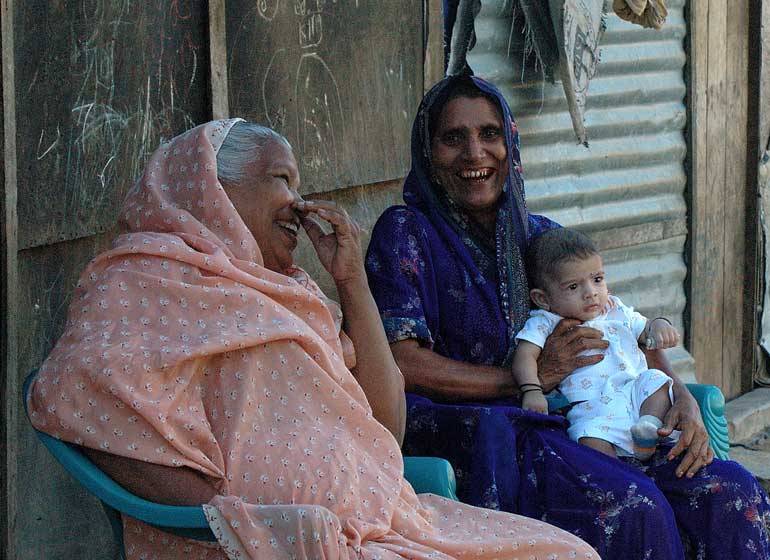Thursday Feb 19, 2026
Thursday Feb 19, 2026
Thursday, 29 October 2015 00:00 - - {{hitsCtrl.values.hits}}
 The Muslim IDPs face many economic, political and cultural difficulties – Credit: Amantha Perera/IPS
The Muslim IDPs face many economic, political and cultural difficulties – Credit: Amantha Perera/IPS
It has been 25 years since the Muslims were forcibly evicted from their homes in the Northern Province of Sri Lanka. It is reported that around 15,000 Muslim families were forcibly expelled by the LTTE from their homes in five districts: Jaffna 3,475, Mannar 8,200, Vavuniya 1,800, Mulaitheevu 1,000 and Kilinochchi 525. 
The displaced Muslims moved to North-Western Province (Puttalam District) where they have been living as IDPs for the past two-and-a-half decades. It is stated that in 2006 there were around 65,000 Muslim IDPs lived in 141 IDP camps in four administration divisions: Kalpitiya (34, 809), Puttalam (20,992), Mundal (5,336), and Vannathavillu (2,008).
Most of these IDPs were poor and faced many problems over the housings, infrastructure, education and health care services, etc. In 2007, the World Bank launched a housing project and provided 6000 houses for the Muslim IDPs. However, the rest of Muslim IDPs (over 40,000) continue to suffer in the IDP camps without any durable solutions.
Vulnerability ofMuslim IDPs
Internal displacement was a horrific event for many Muslim IDPs in Sri Lanka. The life in IDP camps have demoralised men, women, children and elderly people and affected them physically, psychologically, socially, economically and educationally. As for the present challenges, the Muslim IDPs face many economic, political and cultural difficulties.
In Puttalam, 40,000 Muslim IDPs live in the north-west coastal region. The total population of this region doubled with the arrival of Muslim IDPs. When they first arrived, this region was among the least developed areas in the country and was in no position to offer economic opportunities to the IDPs. More than 90% of IDPs depended on dry food-rations provided by the Sri Lankan Government and the World Food Program.
It was not possible for the IDPs to stand on their own feet in such a resource-poor area. Moreover, the arrival of Muslim IDPs also created some contradictions and tense situation between the Muslim IDPs and the local residents in Puttalam.
IDPs are generally vulnerable when compared to refugees. In Sri Lanka the Muslim IDPs who chased from their homes also vulnerable when compared to Tamil and Sinhala IDPs in many ways.
Firstly, regarding the forcible eviction, none of the ethnic groups either Tamil or Sinhalese were forcibly evicted by the LTTE within 24 hours. Further their entire assets both moveable and non-moveable were forcibly taken or looted by the LTTE at gun point. This never happened to any ethnic groups. It is estimated that due to the forcible eviction, the Muslims in the north lost around Rs. 100,000 million at the time in 1990. Until now, there is no compensation or return of these losses. It shows that how vulnerable these IDPs in Sri Lanka.
Secondly, the way of internal displacement which took place in 1990 was horrible. It is reported that no transportation were provided either by the LTTE or the Sri Lankan Government which supposed to take the sole responsibility to protect its own people. Many people walked through the jungle (Wilpattu) over 100 km to reach Puttalam while some others crossed the sea using small boats, timbers, tubes, fibre glass, etc., this was extremely terrible and I wish it will not happen to anyone in the world.
One IDP pointed out that while she was crossing the sea she lost her two-year-old daughter. Another IDP pointed out that while he was crossing the Wilpattu forest his son was killed by the wild animals (interview with Muslim IDPs in Puttalam, 2014).
Thirdly, the host vs. guest conflict between the Muslim IDPs and the local residents in Puttalam. In fact, when a large number of Muslim IDPs came to Puttalam there were many contradictions, misunderstandings and lack of trust between these two groups over various issues. It took for a while for both parties to understand their issues and settle their problems. Some Muslim IDPs pointed out that they were mistreated and side-lined by the local community on various occasions.
From the local communities’ point of view, the Muslim IDPs are competitors for their local resources while from the Muslim IDPs’ point of view they had no option than live in Puttalam and find works in the local area. In fact, there were many cases reported on the host-guest conflicts in the past. However, later both groups began to live as one community with peace and harmony. Currently there is no conflict between these two groups.
Finally the long term stay in IDP camps; although the internal displacement is common for all three ethnic groups, it is the only group which stayed over 25 years at IDP camps without any durable solution either from the Sri Lankan Government or international community.
Protection of Muslim IDPs
Regarding the protection of IDPs, the domestic government has the primary responsibility for protecting the IDPs. IDPs have the rights to request their basic needs and to receive protection from the domestic governments. They shall not be persecuted for making such request. Every human being shall have the right to be protected against being arbitrarily displaced from his or her home of habitual residence. However, it has been found that not all governments fulfil this responsibility in the same manner nor provide equal protection for its own IDPs. 
Many governments are neglectful in their protection regime some deliberately subject their populations to forcible displacement, starvation, mass killings and other serious human rights violations, while some others do not have the capacity to deal with the problem on their own. In situation where the states are unwilling or unable to protect its own IDPs then the responsibility for protecting those IDPs goes to the international community.
In Sri Lanka the Government has acknowledged the responsibility to protect the IDPs and resettled over 300,000 Tamil IDPs in the north and relocated many Sinhala IDPs in the North Central Province of Sri Lanka. However, not much focus was given to the resettlement of Muslim IDPs. It has been six years since the conflict was over however both the Sri Lankan government and International community not focusing much on the resettlement of Muslim IDPs or find any other durable solutions yet.
Durable solutions
According to UNHCR, there are three durable solutions to end the process of internal displacements: Repatriation, Local-integration and Relocation. Repatriation aims to send the IDPs back to their homes and provide both housing and infrastructure for IDPs. Local-integration means to settle the IDPs with the host community. Relocation intends to settle the IDPs in a different area where the domestic government and international organisations can provide housings and other infrastructure for IDPs.
The Sri Lankan Government applied the above three durable solutions to end the process of internal displacements among the Sinhala, Tamil and Muslim ethnic IDPs. As for the Tamils, the Sri Lankan Government mainly used the repatriation as a durable solution and repatriated about 300,000 Tamil IDPs in the Northern Province of Sri Lanka. As for the Sinhalese, the Sri Lankan Government used the Local-integration as a durable solution and locally integrated many Sinhala IDPs in the North Central Province of Sri Lanka.
For the Muslim IDPs, the Sri Lankan Government introduced relocation as a durable solution and relocated about 6,000 Muslim families with the help of World Bank in Puttalam. Although the UNHCR introduced three durable solutions for IDPs, there are no immediate solutions for the remaining (over 40,000) Muslim IDPs in the Puttalam IDP camps in Sri Lanka.
Challenges over resettlement
The resettlement of Northern Muslims IDPs still remains unresolved. Many factors were attributed for the present status. There are four main challenges have hindered their resettlement.
First, there was no substantial plan from the Sri Lankan Government for their resettlement. Second, a significant part of the land that belonged to Northern Muslims were conquered by the LTTE and given to Tamil people during the conflict. Third, the housing assistance was inefficient.
In fact, the Indian Government allocated 50,000 houses for the IDPs but it was not clear how many houses were allocated for the Muslim IDPs. Finally, there was a lack of initiatives targeting the Muslim IDPs as beneficiaries of the post-conflict resettlement projects managed by the Sri Lankan Government or the international organisations.
In fact, the Sri Lankan Government and international organisations focused primarily on the resettlement of Tamil IDPs. From the Sri Lankan Government’s point of view, the resettlement of Tamil IDPs were more important than that of the Muslim minority as it can reduce the tension between the Sinhala and Tamil ethnic groups which were central to the war.
Parallel to this, international organisations and donors have pressured the Sri Lankan Government to resettle the Tamil IDPs. Apart from that there are some challenges over the resettlement of Muslim IDPs. In 2012, a group of Muslim IDPs from Puttalam voluntarily went to Mannar to resettle in their previous homes. However, it was viewed as a violation of Wilpattu forest and temporarily halted their resettlement process.
Conclusion
The overall conclusion of this research is that although the Muslim IDPs are vulnerable compare to other two ethnic IDPs in many ways, still they could not find any durable solutions to end the long term IDP camp life within the country. Moreover, the Sri Lankan Government which is responsible to protect its own people also overlooked and side-lined the Muslim IDPs on various occasions.
Currently, there are many challenges over the resettlement of Muslim IDPs: Land, housing, infrastructure and livelihood issues, etc. At this point both the Sri Lankan Government and international community should help Muslim IDPs to end their long-term stay in IDP camps.
(The writer is a lecturer at the Faculty of Graduate Studies, University of Colombo.)